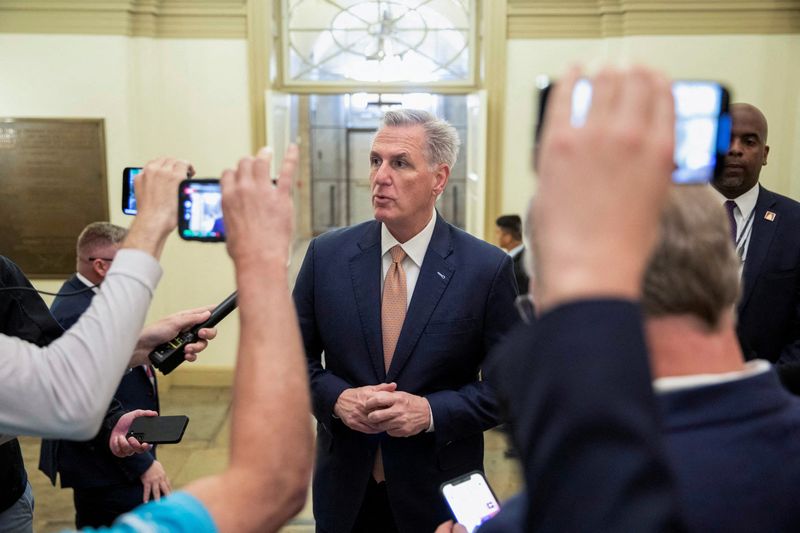By David Morgan
WASHINGTON (Reuters) -The U.S. House of Representatives returned to the job of legislating on Tuesday, after a week-long standoff between Speaker Kevin McCarthy and a small group of hardline Republican conservatives ended in a temporary truce.
The Republican-controlled chamber first voted 219-210 on a gun rights bill favored by McCarthy's hardline critics, under an agreement the two sides reached late on Monday, before moving on to the first of four measures that were sidelined last week.
The firearms bill, brought by hardline conservative Representative Andrew Clyde, would repeal new firearms restrictions on "stabilizing braces," which functionally convert pistols into short-barreled rifles. Such weapons are considered particularly deadly and have been used in mass shootings.
The House then voted 248-180 to pass the Gas Stove Protection and Freedom Act, the first of two Republican gas stove bills that the House is considering this week. It would prohibit the Consumer Product Safety Commission from issuing regulations curtailing the use of new gas stoves.
Neither bill was expected to be considered by the Democratic-led Senate.
Earlier on Tuesday, the House also voted to open debate on three other delayed bills including measures that would give Congress the ability to stop new federal rules and expand judicial oversight on regulatory issues. Votes on those measures are expected later this week.
The return of legislative activity came a week after roughly a dozen conservative hardliners shuttered the House floor for two days to protest the debt ceiling deal between Republican Speaker McCarthy and Democratic President Joe Biden that passed the House on May 31. McCarthy was forced to send lawmakers home early as a result.
"Anytime you walk through things like this, if you have to give up a couple of days as you work through in a conference, it only makes you stronger on the other end," McCarthy told reporters.
But the hardliners, who want deeper spending cuts than those included in the McCarthy-Biden debt ceiling bill, said they stand ready to derail other measures as they seek greater influence over the House agenda.
McCarthy and other key Republicans say they will push for deeper cuts as well.

Ongoing friction from the far right could complicate House passage of 12 appropriations bills that Congress will try to approve before the 2024 fiscal year begins on Oct 1. Lawmakers are also due to take up massive bills renewing U.S. military programs and setting American agriculture policy for the next few years.
"This is ridiculous," Democratic Representative Jim McGovern said of the Republican turmoil. "The only thing I've seen so far since they took over is dysfunction and disarray."